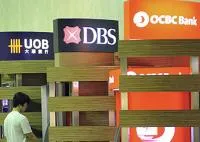
Singapore's 3 big banks moving to a slower growth phase
Their 2Q14 results were very revealing.
The 2Q14 results of three Singapore-based banks--DBS, OCBC, and UOB--showcased a season of slowing loan growth and rising loan yields that mirrored rising funding costs and kept NIMs flat.
According to a research note from CIMB, furthermore, their results showcased a challenging environment for fee and treasury income growth, and little NPLs that started to appear in all places except China (even as China’s credit quality concerns spiked).
The three banks did beat consensus estimates to a degree, though UOB did so on non-core re gains, and looked the least convincing.
DBS did so on NII, but the disappearance of non-NII from its customer flow business meant the beat was more marginal. OCBC looked the most balanced, and cements CIMB’s pre-results position as its top pick in the sector.
CIMB’s order of preference is OCBC, DBS, and UOB. Neutral sector rating maintained.
Here’s more from CIMB:
Both OCBC and DBS had flat margins, UOB (-2bp) was the only one that saw NIMs contract. Both OCBC and DBS had the benefit of not suffering an (expected) bigger contraction in China spreads.
All three saw wider corporate lending yields and were not too fussed about higher deposit funding costs. Only UOB seemed harder hit on the funding front, though this was mostly on Indonesia, not the S$-book.
Both DBS and UOB saw overall deposits shrink qoq, DBS though had chunky deal-related deposit flows to explain for it. We are most concerned about UOB on the funding front.
In light of the Qingdao port fraud, the banks quantified their China trade book and gave colour on the type of trade loans they were financing. For some relativity, DBS’s China trade loans were ~14% of the group’s loans, OCBC’s was 5%, and UOB’s was 6%.
OCBC’s exposure turned out to be even smaller than we first guessed. The banks do have a bigger China book, but a good portion is financing FDI by China SOEs into ASEAN, and are not all trade.
DBS confirmed that it has the largest trade exposure, but explained that it was mostly financing imports into China and was not involved with commodity financing.
Even though China NPLs may be a non-issue, the slowdown in non-interest income from reduced client activities is real. Trade fees, loan fees and treasury income all found it hard to deliver qoq growth.
Only WM did better. OCBC was the only one that delivered qoq fee growth, while it had a good quarter for insurance earnings and that added icing on the cake.



















 Advertise
Advertise









